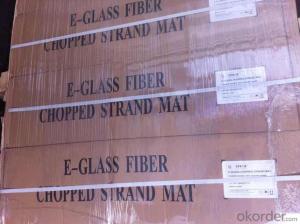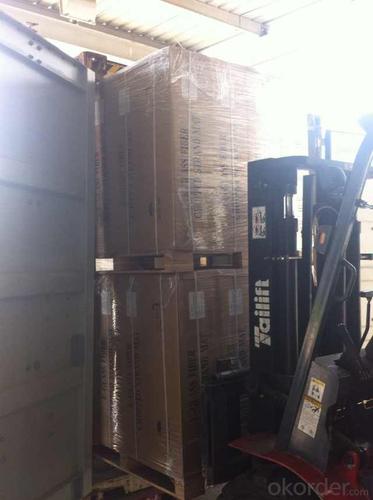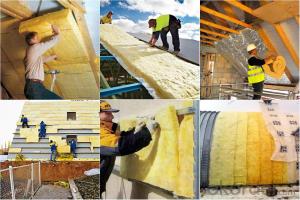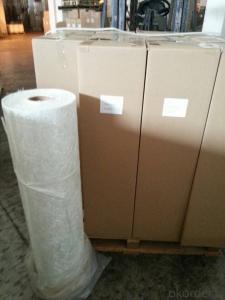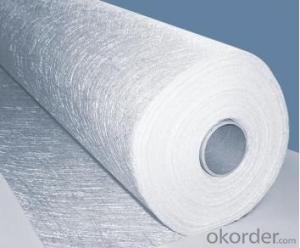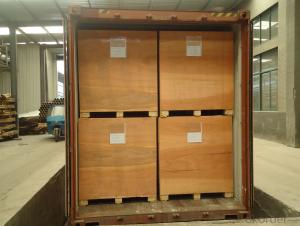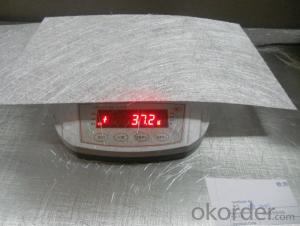Fiberglass Mat Tissue E-Glass Fiber Chopped Strand Mat 225gsm
- Loading Port:
- China Main Port
- Payment Terms:
- TT or LC
- Min Order Qty:
- 20000 kg
- Supply Capability:
- 200000Kg Per Month kg/month
OKorder Service Pledge
OKorder Financial Service
You Might Also Like
Product Description
1.E-glass CSM 225gsm is made of randomly dispersed strands with power or emulsion bonded.
2.Applicable for hand lay-up ,continuous lamination process. Compatible with UP,VE.
3.Suitable for transparent panels,ship bodies,automobile parts and interior decorations ,etc.
1.Consistent thickness and stiffness.
2.Rapid impregnating and good compatibility with resin.
3.Superior wet through with less air trap.
4.Good mechanical properties and high strength of parts.
Technical Data Sheet
TEST ITEM | STANDARD | STANDARD VALUE | AVERAGE VALUE | RESULT |
AREA WEIGHT (G/M2) | ISO3374 | +/-10% | 223 | yes |
WIDTH (MM) | ISO5025 | 0-5MM | 1040 | YES |
WARP TENSILE breaking FORCE (N) | ISO3342 | >=120 | 144 | yes |
WEFT TENSILE breaking FORCE (N) | ISO3342 | >=120 | 143 | yes |
moisture CONTENT (%) | ISO3344 | <=0.2 | 0.1 | yes |
combustible matter CONTENT (%) | ISO1887 | 3.5-3.8 | 3.7 | yes |
FAQ
Packaging&Storage
Eech roll is packed by polyester bag,and then put into a cardboard box or plastic wowen bag.The weight of each roll is between 20 to 85 Kg, The rolls are to be horizontally placed and could be in bulk or on pallet.Optimum storage conditions are between the temperature of 5~35℃ and with the humidity between 35%~65%.The product should be used within 12 months from the time of delivery and remain in theiroriginal packaging until just prior to use.
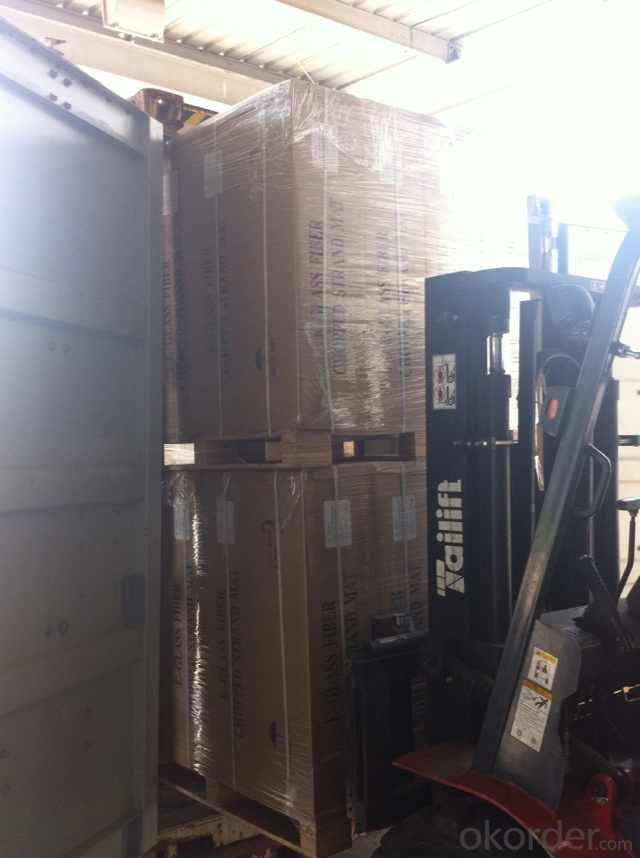
- Q: What is the thickness range of fiberglass mat tissue?
- The thickness range of fiberglass mat tissue can vary depending on the specific product and manufacturer. However, typically, fiberglass mat tissues are available in thicknesses ranging from 0.1mm to 1mm. It is important to note that the thickness of the fiberglass mat tissue can affect its strength, flexibility, and other properties, so it is crucial to select the appropriate thickness for the intended application.
- Q: Is fiberglass mat tissue suitable for marine repairs?
- Yes, fiberglass mat tissue is suitable for marine repairs. It is a versatile material that provides excellent strength and durability, making it ideal for fixing and reinforcing various marine structures and components. Fiberglass mat tissue is known for its resistance to water, chemicals, and corrosion, which is essential in a marine environment. It can be used to repair hulls, decks, bulkheads, and other parts of boats and ships, ensuring structural integrity and preventing further damage. Additionally, fiberglass mat tissue is easy to work with and can be applied using various methods, such as wet lay-up or vacuum bagging, making it a popular choice for marine repairs.
- Q: Is fiberglass mat tissue suitable for insulation in cold storage facilities?
- Cold storage facilities can benefit from the use of fiberglass mat tissue as an insulation material. Fiberglass possesses remarkable thermal insulation properties, effectively blocking heat transfer and maintaining low temperatures in the storage area. Moreover, fiberglass is moisture-resistant and does not absorb water, making it ideal for environments prone to condensation and moisture. The installation of fiberglass mat tissue is simple and offers a cost-effective solution for insulating the walls, ceilings, and floors of cold storage facilities. Ultimately, the use of fiberglass mat tissue plays a vital role in preserving the desired cold temperatures and preventing any thermal leaks in these facilities.
- Q: How is fiberglass mat tissue used in the production of storage sheds?
- The production of storage sheds commonly utilizes fiberglass mat tissue due to its exceptional strength and durability. This material is typically employed as a reinforcement to enhance the structural integrity of the shed's walls, roof, and floor. During manufacturing, fiberglass mat tissue is frequently applied to both the exterior and interior surfaces of the shed. It is initially impregnated with a binding resin, usually polyester or epoxy. The resin-soaked fiberglass mat tissue is then layered onto the shed's panels or molds. Once in position, the resin is cured, either through heat application or a chemical reaction, which solidifies the material. This process creates a rigid, lightweight composite structure that is highly resistant to cracking, warping, and rotting, as well as being weather-resistant. The fiberglass mat tissue acts as a reinforcing layer, providing additional strength and stability to the shed. It helps evenly distribute loads across the structure, making it more resistant to impacts and external forces. Additionally, it prevents the shedding of particles, enhancing the overall appearance and cleanliness of the shed. Moreover, fiberglass mat tissue offers excellent thermal insulation. This insulation helps regulate the shed's temperature, keeping it cool in the summer and warm in the colder months. It also reduces energy costs by minimizing heat transfer. In conclusion, the inclusion of fiberglass mat tissue significantly improves the durability, strength, and insulation capabilities of storage sheds. It ensures a long-lasting and reliable structure that can withstand various weather conditions while providing a comfortable and secure storage space.
- Q: Can fiberglass mat tissue be used for insulating radiant floors?
- Yes, fiberglass mat tissue can be used for insulating radiant floors. It is an effective insulation material that helps to minimize heat loss and improve energy efficiency in radiant floor heating systems.
- Q: How is fiberglass mat tissue used in the production of composite panels?
- Fiberglass mat tissue is commonly used in the production of composite panels due to its unique properties and versatility. It serves as a reinforcement material that helps enhance the strength, durability, and overall performance of the composite panels. In the production process, fiberglass mat tissue is typically sandwiched between layers of resin to create a composite structure. The tissue acts as a reinforcing layer, providing additional strength and stability to the panels. It helps distribute the stress applied to the panel evenly, reducing the risk of cracks or fractures. One of the key advantages of using fiberglass mat tissue is its ability to improve the impact resistance of composite panels. The tissue absorbs and disperses energy when subjected to external forces, minimizing the risk of damage or breakage. This makes it an ideal choice for applications that require high impact resistance, such as automotive parts, boat hulls, or aircraft components. Fiberglass mat tissue also offers excellent corrosion resistance, making it suitable for use in environments with high humidity or exposure to chemicals. It acts as a barrier that protects the composite panels from moisture and corrosive substances, extending their lifespan and ensuring their long-term performance. Additionally, fiberglass mat tissue is highly moldable, allowing for the creation of complex shapes and designs. It can be easily molded into various forms, providing flexibility in the production process and enabling the creation of customized composite panels for specific applications. Overall, fiberglass mat tissue plays a crucial role in the production of composite panels by reinforcing the structure, enhancing impact resistance, improving corrosion resistance, and enabling flexibility in design. Its unique properties make it a popular choice in industries such as construction, transportation, aerospace, and marine, where high-performance and durable composite panels are required.
- Q: Can fiberglass mat tissue be used for insulation purposes?
- Yes, fiberglass mat tissue can be used for insulation purposes. It is commonly used as a layer in insulation systems to provide thermal resistance and enhance the overall insulation performance.
- Q: Does fiberglass mat tissue require any special precautions during disposal?
- Yes, fiberglass mat tissue does require special precautions during disposal. Due to its composition, fiberglass mat tissue can release fine particles and fibers into the air when handled or broken. These particles and fibers can be harmful if inhaled or come into contact with skin and eyes. Therefore, it is important to take certain precautions when disposing of fiberglass mat tissue. Firstly, it is recommended to wear appropriate personal protective equipment (PPE) such as gloves, goggles, and a respirator mask to minimize the risk of exposure. This will help prevent the inhalation of airborne particles and fibers and protect the skin and eyes from any potential irritation. Secondly, fiberglass mat tissue should be disposed of in sealed bags or containers to prevent any loose fibers from becoming airborne during transportation. It is also advisable to label the bags or containers as "hazardous" or "fiberglass waste" to alert others of the potential risks. Furthermore, it is important to follow local regulations and guidelines for the disposal of fiberglass mat tissue. Depending on the location, there may be specific requirements for handling and disposing of hazardous waste materials, including fiberglass. These regulations are in place to protect public health and the environment. In summary, fiberglass mat tissue does require special precautions during disposal to minimize the risk of exposure to harmful particles and fibers. Wearing appropriate protective equipment, using sealed containers, and following local regulations are essential steps to ensure safe disposal practices.
- Q: Is fiberglass mat tissue resistant to mold and mildew?
- Yes, fiberglass mat tissue is resistant to mold and mildew due to its non-porous and moisture-resistant properties.
- Q: Can fiberglass mat tissue be used in corrosive environments?
- Fiberglass mat tissue can be used in corrosive environments to some extent, but its resistance to corrosion depends on the specific composition and quality of the material. Fiberglass mat tissue is typically manufactured using a combination of fiberglass strands and a binder material. While fiberglass itself is generally resistant to corrosion, the binder material used in the mat tissue can vary and affect its resistance to corrosive environments. Some binders may provide better protection against corrosion, while others may be more susceptible to degradation. To enhance the corrosion resistance of fiberglass mat tissue in corrosive environments, additional protective coatings or treatments can be applied. These coatings can provide a barrier against the corrosive elements and extend the lifespan of the material. It is important to consider the specific corrosive environment and consult with experts or manufacturers to determine the suitability of fiberglass mat tissue for a particular application. They can provide guidance on the ideal composition, treatment, and any necessary precautions to ensure optimal performance and durability in corrosive environments.
Send your message to us
Fiberglass Mat Tissue E-Glass Fiber Chopped Strand Mat 225gsm
- Loading Port:
- China Main Port
- Payment Terms:
- TT or LC
- Min Order Qty:
- 20000 kg
- Supply Capability:
- 200000Kg Per Month kg/month
OKorder Service Pledge
OKorder Financial Service
Similar products
Hot products
Hot Searches
Related keywords

